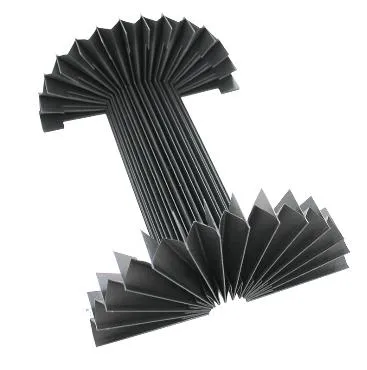Understanding Bellow Covers
Bellow covers are an essential component for protecting machinery parts like shafts, screws, or guide rails from environmental factors such as dust, debris, and liquids. These covers, often seen in industries ranging from manufacturing to medical equipment, play a crucial role in extending the lifespan of machinery and improving operational efficiency.

What Are Bellow Covers?
Bellow covers, also known as protective bellows, are flexible and expandable protective coverings. They are designed to safeguard machine components that require movement while ensuring that contaminants like dust, oil, or water do not interfere with their operation.
Common Bellow Cover Materials
The material used for bellow covers is crucial, as it determines their durability, flexibility, and suitability for specific environments. Below are some common materials used in bellow covers:
Fabric Bellows
- Materials: Nylon, polyester, coated fabrics (PVC, neoprene, or polyurethane).
- Features: Lightweight, flexible, and resistant to wear and tear.
- Applications: Light-duty machinery, robotics, and medical devices.
Rubber Bellows
- Materials: Natural rubber, EPDM, neoprene, or silicone.
- Features: High flexibility, excellent weather resistance, and vibration absorption.
- Applications: Outdoor machinery, automotive components, and industrial applications.
Plastic Bellows
- Materials: Polypropylene, polyethylene, or PVC.
- Features: Lightweight, rigid, and chemical-resistant.
- Applications: Chemical processing and equipment with corrosive exposure.
Metal Bellows
- Materials: Stainless steel, aluminum, or brass.
- Features: Durable, heat-resistant, and capable of handling high pressures.
- Applications: High-temperature environments, aerospace, and heavy machinery.
Leather Bellows
- Materials: Genuine leather or synthetic leather.
- Features: Durable and aesthetically pleasing.
- Applications: Traditional tools and specific industrial applications requiring abrasion resistance.
Benefits of Bellow Covers
- Protection: Shields sensitive components from contaminants like dust, oil, or liquids.
- Durability: Extends the lifespan of machinery by preventing damage to exposed parts.
- Flexibility: Accommodates various movements, including compression, expansion, and angular motion.
- Versatility: Available in multiple materials and designs to suit different applications.
- Cost-Effectiveness: Reduces downtime and maintenance costs by safeguarding critical parts.
Applications of Bellow Covers
- Machine Tools: Protecting guideways, ball screws, and spindles.
- Robotics: Covering robotic arms to prevent debris interference.
- Medical Equipment: Ensuring sterile and contaminant-free operation.
- Transportation: Safeguarding railways, buses, and automotive parts.
- Aerospace: Protecting aircraft components exposed to extreme temperatures.
Factors Affecting Bellow Cover Pricing
- Material: High-performance materials like stainless steel or silicone are more expensive than basic fabrics or plastics.
- Size: Larger bellow covers require more material and are typically more costly.
- Customization: Tailored designs for specific machines or environments increase the cost.
- Quantity: Bulk orders may lower the unit price.
- Environmental Resistance: Covers with advanced resistance to heat, chemicals, or abrasion are priced higher.
Price Range for Bellow Covers
- Fabric Bellow Covers: $10–$50 per unit, depending on size and fabric type.
- Rubber Bellow Covers: $20–$100 per unit, based on material quality and thickness.
- Plastic Bellow Covers: $15–$60 per unit, depending on durability and design.
- Metal Bellow Covers: $50–$200 per unit, owing to high material and manufacturing costs.
- Custom Bellows: Prices vary widely, typically starting at $100 for specialized applications.
Choosing the Right Bellow Cover
When selecting a bellow cover, consider the following:
- Environment: Assess exposure to temperature, chemicals, and physical impact.
- Movement Type: Ensure the cover accommodates the required motion (linear, rotary, or angular).
- Size and Fit: Choose a cover that fits securely without hindering machinery function.
- Material Properties: Match the material to the operating conditions for durability and efficiency.
Bellow covers are vital for protecting machinery components, reducing maintenance costs, and ensuring smooth operation. Whether you need a flexible rubber bellow, a robust metal bellow, or a lightweight fabric bellow, the right material and design can significantly impact performance. Evaluate your specific needs and consult a bellow cover supplier to select the best option for your application.








